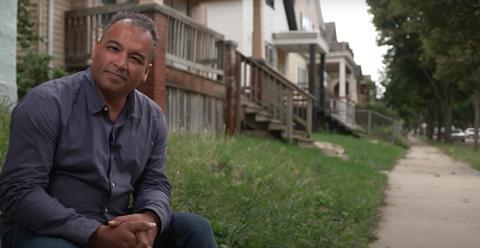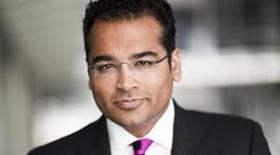Future of Content: strong TV journalism is absolutely vital in an age of digital disruption and difficult political discourse, says Krishnan Guru-Murthy
How is it possible to miss having meetings? At Channel 4 News we had too many meetings, spent too long in them and talked too much nonsense during them.
A principle has been that anyone and everyone in the newsroom could pitch any idea, which is great in theory. People showed off their knowledge of far-off places and little-read books, scored points, made impassioned speeches and teased each other like guests on a TV panel show.
How awful! How Channel 4! How I miss it! When the virus is beaten will things be like they used to be?
Of course not. Zoom meetings, working from home and a relentless, all-consuming story driven by science and data has changed us forever, but it has also made us appreciate each other and the culture we’d taken for granted: we’re journalists who fundamentally care, who want to reveal the truth, hold power to account and who still believe in the power of that to help make the world a better place, and who enjoyed the camaraderie of sharing the same room.

I remember my first morning meeting at Channel 4 News in 1998. A programme editor keen to exert authority was firing questions at the team about why their stories deserved to be on the show. “But isn’t this just a numbers story, Neil? Why should I care about it?”
The economics producer Neil Macdonald, still with us and still patiently answering our questions, replied: “There is no reason you should care. You either care or don’t.” I knew I was going to fit in.
Twenty-two years later I found myself in Wisconsin in the middle of a pandemic-blighted US election campaign filming our investigation into how the Trump campaign disproportionately targeted black people to deter them from voting in 2016.
This was a story that brilliantly encapsulated how, on Channel 4 News, everything has changed and nothing has changed. A massive leak of the Trump campaign database had taken our team months to secure, decipher, process and understand.
This was hi-tech, 21st century investigative journalism at its finest. Yet when it came to revealing the impact of this digital deterrence strategy and telling the story to our viewers it was as old-fashioned as you could get.
We had to find the humans in the machine and ask how they felt. It meant taking the names from the data and going house to house knocking on doors to find them.
Age-old skills
The story mattered and was noticed and picked up across America on social media, TV, radio and print; even Barack Obama nodded to it. The people responding were often saying the same thing – that it made them more determined than ever to vote in 2020.
The lesson for me was also clear: that digital journalism and understanding data are vital to telling the truth of this time, but that the age-old skills of storytelling and holding power accountable are crucial if you want to make viewers notice.
I don’t remember a time when people in power liked being on Channel 4 News. Through Labour, coalition and Conservative governments, we’ve never been the preferred port of call. There has always been the expectation that we will ask the difficult question without fear nor favour and not be fobbed off with the rehearsed answer.
Politicians used to accept this was part of their job in a democracy. As former Chancellor Ken Clarke would say to me: “If you can’t defend your policy in a TV interview, it’s probably not a very good policy.”
But in recent years some politicians have stopped believing they should face challenging questions. They instead prefer media to be a conduit for their message, not a place where it is tested. Dominic Cummings maybe gone but he isn’t the only one in politics who wants to “whack” difficult broadcasters and bring the rest to heel.
Some believe the fewer regulated, independent and impartial news organisations exist, the better. Right now, the government’s review into public service broadcasting is asked to question whether the UK even needs regulated channels beyond the BBC, whose funding and licence, of course, the government controls.
Through Channel 4 News, ITN serves the PSB remit of Channel 4 to cover stories others don’t; to serve audiences – especially minorities that aren’t in the mainstream – and to go to places around the world that are under-reported. That unique remit has always been the driving force of the team and it literally determines our daily decisions.
“Some politicians have stopped believing they should face challenging questions”
Once, at a Syrian border check I was allowed entry but my colleagues were refused because military intelligence had blacklisted them for previously entering rebel territory. We had to decide what to do: should we all go back and risk never being allowed in or should I go on to Damascus alone?
The need to tell the story, knowing we were the only ones from British TV there at the time, demanded I press on to join our Syrian fixer and do what I could.
Ten years ago, with no cameraman, editor or producer I’d have been stuck, unable to file a thing. These days all I need to make TV journalism in extremis is a smartphone, and whilst maybe a million watched the TV programme, many millions more watched on digital platforms.
That remit it is also why – when no outside journalist could enter eastern Aleppo in Syria – we employed Waad Al Kateab as she documented the hellish impact on the people around her of the Russian and Syrian advance. Her Oscar-nominated documentary For Sama, produced by Channel 4 News and ITN Productions, has had a profound impact on viewers around the world and spread with it the values of Channel 4 and British public service broadcasting.
It’s also why we exposed Cambridge Analytica and then revealed Trump’s targeting of black voters in 2016 – not to vote for him but to ensure they didn’t vote at all.
On the other side of the Covid disaster we will once again have the programme time and freedom to travel to report all those stories the pandemic has crowded out, and we will no doubt factor in everything we have learned this year about structural disadvantage and how something you think is a great leveller, like a pandemic, does in fact discriminate.

We need to look out for how that changes the way we report other problems too. In the meantime, I try to keep in mind the words of one of my most recent interviewees – via Zoom – the Dalai Lama: “Choose to be optimistic, it feels better.”
- Krishnan Guru-Murthy is a presenter for Channel 4 News





![Coming in 2021 on channel 5 - Doctors at War_edited[1][1]](https://d11p0alxbet5ud.cloudfront.net/Pictures/100x67/3/5/5/1336355_comingin2021onchannel5doctorsatwar_edited11_16931.jpg)
